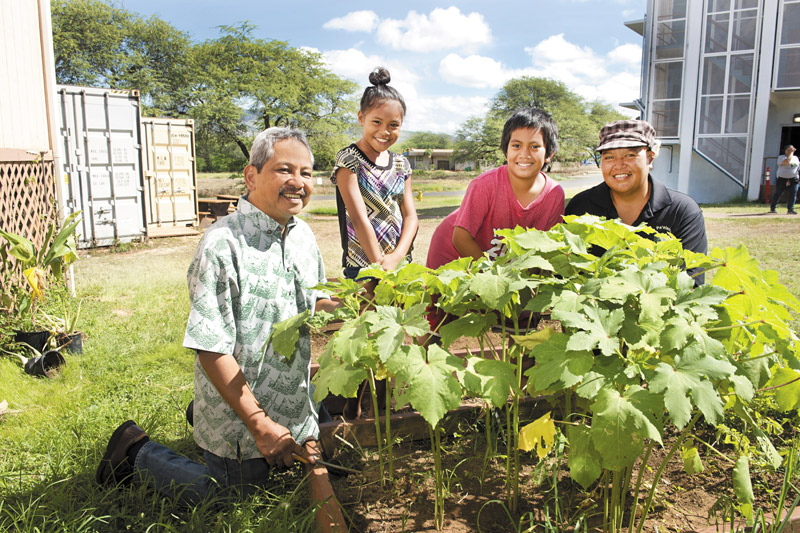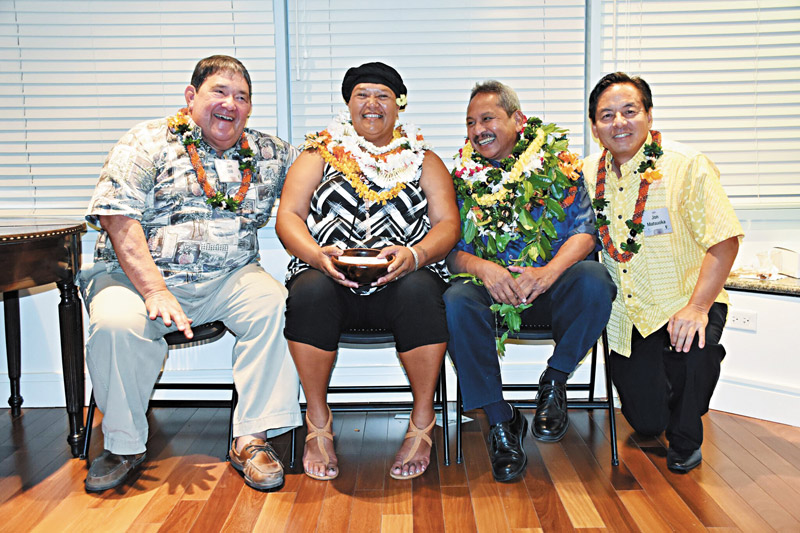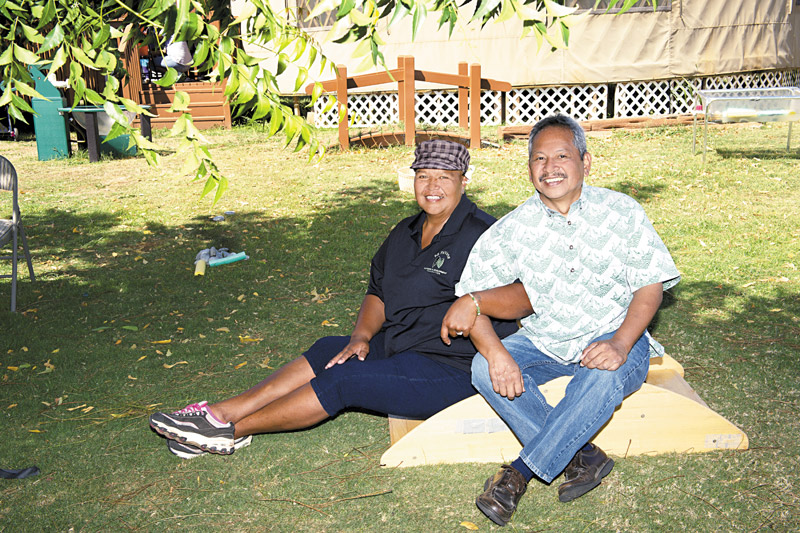Patching The Cracks In Society

Say congratulations, and mahalo, to recipients Bob Agres (left) and Sweets Wright for their work in turning around the lives of Oahu’s homeless. They’re pictured with keiki Mia Melson and Angelo Abner
The inaugural Pewa Award, named for the ‘bowtie’ plugs used to repair a crack in a koa canoe or calabash, honors those without whom our social structure would begin to come apart. Say congratulations, and mahalo, to recipients Bob Agres (left) and Sweets Wright for their work in turning around the lives of Oahu’s homeless. They’re pictured with keiki Mia Melson and Angelo Abner
You may never have heard the word “pewa” before, but you most certainly have seen one. In most any carved Hawaiian woodworks, from the humble gourd to the ocean-conquering canoe, you will notice little bowtie-shaped insets throughout the structure. These are the pewa, inserted where the wood is cracking — they keep the wood together and the bowl or boat usable.
They are small but crucial, as without them the canoe would be lost, giving in to a fissure that would end the vessel’s usefulness.
This is the inspiration for the Pewa Award, presented by Consuelo Foundation and Partners in Development Foundation (PIDF) to honor those in our community without whom our social structure would begin to come apart at the seams. The first awards were given out earlier this year, honoring Sweets Wright for her work with the homeless, and Bob Agres for helping connect small businesses and entrepreneurs with power brokers.
“There are award dinners seemingly on a weekly basis, but oftentimes the people being recognized are folks in the corporate sector or politicians, or people who are very high profile, and sometimes the giving-back part gets mixed with upward-mobility motive,” says Dr. Jon Matsuoka, CEO of Consuelo Foundation.

Sweets Wright and Bob Agres are congratulated by (far left) Jan Dill, founder of Partners In Development, and (far right) Jon Matsuoka, CEO of the Consuelo Foundation CONSUELO FOUNDATION PHOTO
“When I think about Pewa and the first awardees, I think of people giving of the self without an expectation of return other than elevating all of humanity. When I think about Sweets and Bob, those are two really exemplary folks who are just giving from their heart with no expectation of recognition or return.”
It takes these types of unselfish actions to inspire real change in people’s lives, for belief that you can make yourself better comes not from the structure of systems, but the confidence of another human being.
“Our benefactress Consuelo Zobel Alger believed in the restorative power of hope,” says Connie Lau, Consuelo Foundation board chairwoman. “If you listen to the homeless whom Sweets Wright has helped, you can hear how she has brought hope back into their lives and the lives of their children. And Bob Agres has given his beneficiaries the hope that they now can provide for themselves and others. They are indeed unsung heroes in our communities.”
But this is the moment for their songs to be sung, even if Wright is a little shy around the mic. A self-proclaimed “Auntie Tita,” she is a force in the Leeward Coast homeless community, not afraid to dole out tough love when it is needed.
“I’m not going to lie — a lot of the families have their own problems with abuse, alcohol, drugs. It was hard for them to have someone they could trust and make sure they do it,” says Wright, a Waianae resident herself. “I am the Auntie Tita, if you gonna need one crack or slap or pinch, I am going to go there with you. If I am going to help, I am going to give you 150 percent, and if I am, then I at least expect you to give me 25 (percent).”
The program is known as Ka Paalana Homeless Family Education Program or, more affectionately, the “preschool under the blue tarps.” It has 21 different stations for kids to learn reading, writing and various fine motor skills.
The only catch: Parents or caregivers have to attend as well.
The approach they have found most effective in reaching the homeless is through these “pop-up pre-schools” they run from Kalaeloa to Waianae Boat Harbor. They have a fully functional preschool loaded up in their van, they drive to a spot where they know there are families, and before they can get their 20-by-20 tents fully unloaded, the children will come barreling out of the bushes yelling for their parents to come.
“The secret is it is not a drop-off — the parents have to come — and what happens is we get to work with their parents,” says Jan Dill, founder of PIDF. “Soon we saw this chemistry developing between the caregiver, the parent and the child — that had not been before because now they are all involved and learning.”
For it is not just the kids who need early-childhood education, but parents need a reminder that the kids are not just major expenses for them, but are their future.
“Retrain the parents that they are the child’s first teacher — it is not just sending them to school, but you can teach your child at home to play and have fun,” says Wright. “I am one of those aunties who likes to teach the kids to get dirty and have fun making a mess.
“These families trusted me that much that, when we did preschool, they opened their whole story to me. That is what made the bond with a lot of them. We can’t just help them to bring them to the preschool, but we got to help them to help themselves first. If I can do this for myself, then I can do it for my child.”
This opening of their lives leads Wright’s life to become intertwined with theirs, taking them to the welfare office or AA meetings, or to lawyers to help sort out legal problems. She literally has become auntie to dozens of families on the Leeward side, an utterly selfless existence that is made possible by her ever-patient husband Noa, and the example of Auntie Alice Holokai for her while growing up in Papakolea.
Holokai served as the la‘au lapa‘au or, roughly translated, the “healer” for her community. Wright was a sickly child and spent a lot of time with Holokai, who imparted to her the Hawaiian way of taking care of others.
“You do it, but you do it from the heart, you don’t expect nothing back, it is given from the heart,” says Wright, who was constantly reminded of why it was important to hear what Holokai had to say. “She used to tell me, ‘Remember these things because if you don’t remember them, it is going to die.’ So I gonna teach what I can.”
While Wright may not be healing all that physically ails others as Holokai did, she is helping to mend hearts and reassemble families. But once those first baby steps are taken, how do these families rejoin society?
This is where Agres comes in.
“Bob is the next level. Sweets gets them in the motion forward and then they get into issues that Sweets can’t handle, but Bob can help them sort it out and open the door to the next level. He teaches them sustainability,” says Dill. “It is so wonderful to join these two, the two parts in a progression in the Pewa concept: Sweets at the granular level and Bob is the next step that connects them to the larger community, and how you survive in the larger community.”
Working for Islander Institute and founding Nonprofit Information Networking Association, Agres gets people together. Whether it is a kipuka in Pearl City or forestry work on Hawaii island, he connects people with the agencies or investors they may need. He doles out advice on how to get jobs or create your own work or move forward your big idea.
In other words, he helps you get that first push that leads to success, and learn how to keep that momentum going forward once it does.
“I try to teach families how to have some choice in their lives. A lot of times it is financially related, and in hard times they spin out of control,” says Agres. “We are working on children’s savings accounts, individual development accounts where you have matched savings. These are ways to build some reserves, so they can have stability and make some progress, because without the reserves all it takes is to get sick or lose a job and they are right back where they were.”
Adds Kaulana Park, board chairman for PIDF: “Bob always has been a mentor passing on the importance of economic life skills and knowledge, while Sweets has been an encourager giving hope to our most vulnerable kamaaina. The common thread they both live out is an unselfish servant attitude toward others. As we say here, ‘Recognize others, be recognized, help others, be helped. Such is a family relationship.'”
Helping those among us who have fallen through the cracks and patching those breaks so that others don’t follow, that is the role of the pewa in our community.






